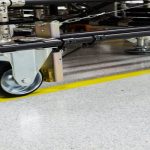For many scientists, the love for science started in the kitchen or the living room. It has to. Yes, science is taught in school and the spark can be ignited in the classroom, but engaging your child in cooking and simple science experiments and television lessons at an early age could be what influences your child growing up to be a researcher, engineer, doctor or Chemist. Studies show that not nearly enough students are interested in becoming scientists to fill the need we will have twenty years from now.
Simple Experiments
Simple experiments done in the home with your budding scientist are a great way to teach them about process, organization, recording information and results driven investigation. An experiment can be fun and delicious. Testing the affect of M&M’s on a chocolate chip recipe can be tested and overseen by you and your Jr. lab assistant. Test how fast they are eaten. Do they cook better at different times? Do they cost the same? By implementing the scientific method in fun experiments like these, you will be preparing them for important experiments and research they will do in the future.
Complex Experiments
Much more complex then testing the taste value of M&M’s versus chocolate chips are the ones your student will do in high school and college. Instead of baking cookies in an oven they will be performing dielectric barrier discharge testing with plasma power supply systems. Dielectric barrier discharge systems may be a mouthful and you may have never even heard of a plasma power supply system, but they’re commonly used for testing and regulating products we come in contact with everyday such as the process of removing bacteria and organic contaminates from drinking water with the use of chlorine gas or treating public pools, aquariums and fish ponds with ultraviolet radiation or to help textiles absorb dyes or become more sterile.
Prepare Them For The Complex
Investigating what a high school science syllabus looks like could prepare you for the complex questions your student will have in the future. Having the answers or the general understanding or at the very least resources in place to where your student can get the extra help can help them successfully getting over that last hurdle before they take the plunge into a science undergraduate degree. College students are on their own in many ways, but until then it’s up to you to help guide and support them towards a fulfilling career that will challenge and reward them in the future. Click here to get additional info.






